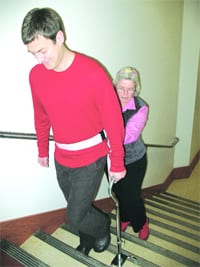Safe Passage STCC Workshop Gives At-home Caregivers Necessary Skills
Hands-on learning is a valuable component of any college education, especially one in health care. That was the case at a recent workshop at Springfield Technical Community College — but this time, the students were teaching the teachers.
The event was a ‘caregivers workshop’ conducted by students and faculty from the Physical Therapy Assistant and Occupational Therapy Assistant programs. The target audience was STCC faculty and staff who care for — or expect to care for — aging parents and other family members.
“Originally, we ran this for an agency that owns and operates several group homes in the area; we provided a caregivers workshop for their staff members last spring,” said Marianne Joyce, chair of the Occupational Therapy Assistant program. “We decided to run it again, but for a different population — our own faculty and staff at STCC.”
In the workshop, seven students offered three different learning stations, dealing with fall prevention and home safety, walking safely and navigating stairs and curbs, and safe transfers for movements such as bed to wheelchair and wheelchair to toilet. Joyce said faculty did much less — and students took more control — than in the first, off-campus workshop.
“The home-safety station was designed to help caregivers understand the hazards around the house and correct them,” she explained. “They also introduced assistive equipment for the bathroom and talked about what to do if someone starts to lose their balance, how to bring them to the floor without hurting themselves or the person falling.”
The walking station dealt with how to get a frail elderly individual up and down stairs and curbs. The focus was on proper body mechanics as well as making sure canes and walkers are the proper height for the user — two aspects of caregiving, she said, that are sometimes overlooked by caregivers who don’t think they make a difference.
Body mechanics were also a key component of the transferring station. “These are simple things, like not allowing the person to hold onto the car door,” Joyce said. “So many people do that, and it’s so dangerous.”
Practice Makes Perfect
The event concluded with a question-and-answer period, but it was clear that participants got the most out of the hands-on demonstrations of how to help their loved ones navigate their lives.
“Thank you so much to these very caring and attentive students,” one faculty member wrote in an evaluation afterward. “I loved having the opportunity to practice, and I would have liked to have more time to practice.”
It looks like that will happen. “The students also liked the opportunity to practice and be critiqued on their performance, so as a result we’ll be running it again next year — and we’ll afford even more time to doing actual practice,” Joyce said.
She noted that the original point of these workshops was to target the growing number of Baby Boomers who are caring for older relatives, and it soon became obvious that students didn’t have to leave campus to find plenty of those caregivers. Eleven faculty and staff participated this year, but that number is expected to rise next year as word gets out.
“Community-based health care is no longer only about addressing problems once people exhibit illnesses or injuries,” Joyce said. “The community-based model is all about wellness and prevention” — which, in many cases, includes basic household safety.
Indeed, according to the National Safety Council, about 30{06cf2b9696b159f874511d23dbc893eb1ac83014175ed30550cfff22781411e5} of 65-year-old women can expect to fall at some point, a number that rises to more than 50{06cf2b9696b159f874511d23dbc893eb1ac83014175ed30550cfff22781411e5} after age 85. For men, the odds are 13{06cf2b9696b159f874511d23dbc893eb1ac83014175ed30550cfff22781411e5} in the 65-69 age group and about one-third at age 85. Certain fall-related injuries, especially hip fractures, carry high morbidity and mortality rates.
Moreover, elderly people living at home are at increased risk of falls, and even moreso if they live alone, even if they have help at certain times of the day. Even at the younger and healthier end of the elderly spectrum, environmental hazards such as stairs are significant factors. Clearly, workshop participants said, any help in cutting down the instances of falls is a positive thing.
“This was a wonderful experience, and the students did a great job,” said Paula Goodreau, director of Sales, Marketing, and Contract Training for the Center for Business and Technology at STCC. “It’s a good education for those of us who have elderly folks we need to care for. This was good information, and I’m looking forward to more of this.”
“Overall, it was a very positive experience for the participants as well as the students,” said Joyce, who worked with Linda Desmarais, chair of the Physical Therapy Assistant program, to organize the event. “The students got to reinforce the concepts they had learned in the two programs and had the opportunity to work with real clients. Now they’ll present their project and the results at an honors luncheon in the spring.”
Real-world Experience
Goodreau agreed that students need such experiences practicing their recently learned skills on people who really need the lessons. “It prepares them for real-world experiences before they get out into that environment,” she said.
“When I look at the students’ educational requirements, we’re all accredited through the national associations, and they set the standards,” Joyce noted. “One area that’s required is the evaluation and treatment of actual populations in the community” — an idea reflected in other areas of STCC’s health programs, such as a dental clinic and a health and wellness clinic that are open to the public.
“That’s the wellness and prevention piece,” she added. “This event offered us a vehicle to do that.”
And if the lessons learned help prevent a few accidents, then the students will have made a difference in people’s lives long before earning their diplomas.

